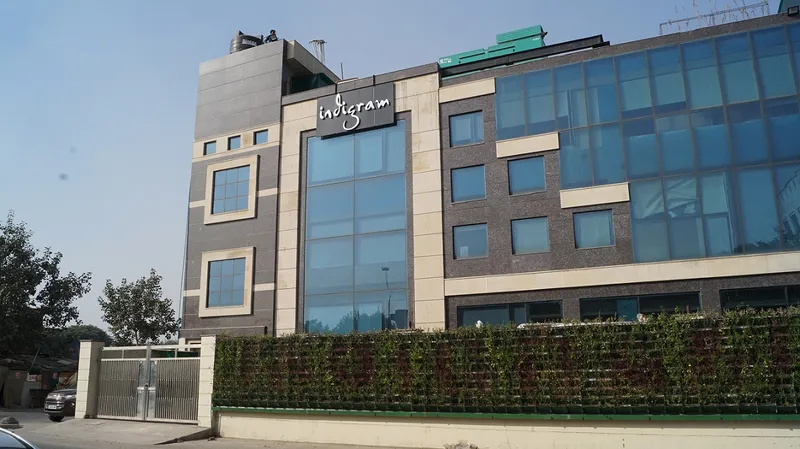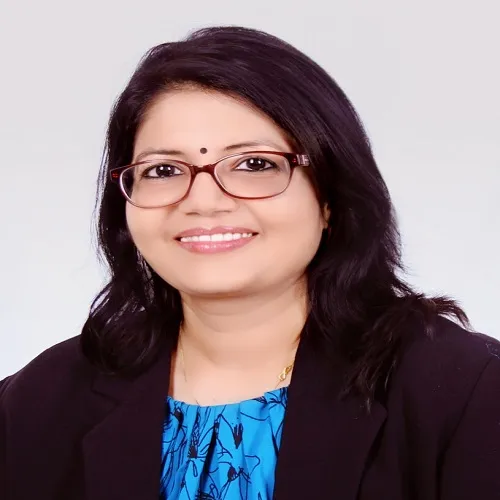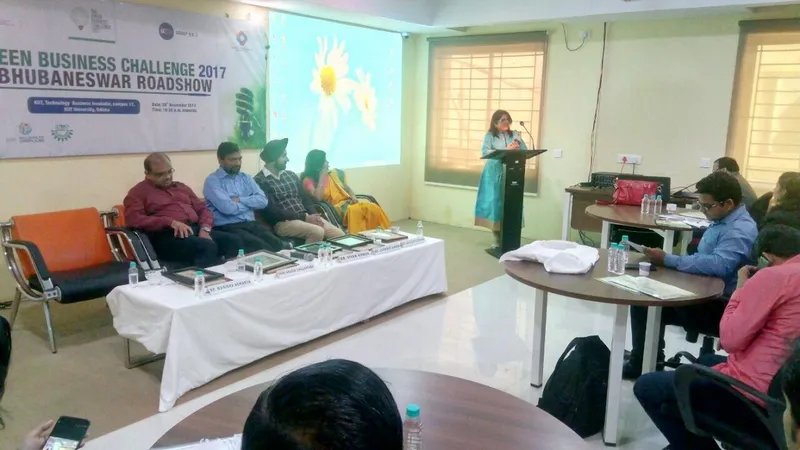Transformation through agri-tech startups: how Indigram Labs nurtures entrepreneurs in agriculture and food processing
From AI and sonar to organic produce and pest detection, here are some of the emerging agri-tech startups in India.

[This article is part of the YourStory series Startup Hatch, about incubators, accelerators and makerspaces in the startup ecosystem. See earlier profiles of initiatives at IIT Bombay, IIM Bangalore, BITS Pilani, NCL, Tata Elxsi, Axilor, NID, IIIT-Bangalore, IIIT-Hyderabad, Vellore Institute of Technology, PSG Coimbatore, Workbench Projects, Makers Asylum, Appy Hours, Turning Ideas, NetApp Excellerator, Pitney Bowes Accelerator, TechStars, Ashoka Innovators, and Startup Leadership Programme.]
Dr. Manisha Acharya, CEO, Indigram Labs Foundation, has over 15 years of combined experience in diverse areas including incubation eco-system development. This spans incubating the incubators, incubation and innovation management (with focus on bio-tech, healthcare, nano-tech, IT, ITES, IoT and other manufacturing and engineering sectors), startup management, mentoring, entrepreneurship development, and life sciences research.
Manisha joins us in this interview on the vision, progress and achievements of Indigram, and provides a number of recommendations for government as well as aspiring agri-entrepreneurs in India.
YourStory: What was the founding vision of your incubator, and how is it supported?
Manisha Acharya: Indigram Labs Foundation (ILF) is a technology-based incubator founded in October 2015 with a vision to promote creativity and innovation in agriculture, renewable energy, and rural healthcare industry. We aim at fostering and nurturing viable business ideas through the process of consulting, mentoring, prototype creation, leveraging technology tie-ups and access to platforms.
ILF has been supported by the Department of Science and Technology since September 2016, via the National Science and Technology Entrepreneurship Development Board, Govt. of India. Our host organisation is Indian Society of Agribusiness Professionals (ISAP). Indigram, as a group, has been around for 18 years and has promoted as well as incubated multiple ventures over the years.
ISAP has a large physical presence across the country in 18 odd states. ISAP also has a very large digital media presence with its Facebook, apps and Whatsapp groups with a reach of around 400,000 professionals, entrepreneurs, students and farmers; a vast majority of them are youth.
ISAP has set up more than 1,800 agri-based ventures through its Agri-Clinics and Agri-Business Centres (ACABC) programme and has around 50 agri-business experts in various verticals who help us in mentoring our incubatees. This experience became the seed for entrepreneurship development through Indigram Labs.

YS: Which startups are currently being incubated?
MA: We are a young organisation of 2.5 years; we have 18 companies being incubated. Here are profiles of some of them; a few are ready to be graduated soon.
New Leaf Dynamic Technologies was founded in 2012 by Anurag Agarwal and Akash Agarwal. It has developed a refrigeration system powered by farm waste. GreenCHILL is off-grid, compressor-free, and renewable energy-based. It uses biogas, cow dung cakes, biomass pellets, wood, and hay, and allows safe and sustainable cooling of perishables (eg fish, fruit, vegetables, flowers) at the village or farm level before transport to a market or to a processing facility. GreenCHILL can cool 1,500 liters of milk or up to 30 tons of perishables without the need for grid power or diesel generator backup. New Leaf has commissioned 12 units in Gujarat, Assam, Orissa, and Uttarakhand.
Intello Labs was founded in 2016 by Milan Sharma and Nishant Mishra. It has developed an AI-based deep-tech solution for crop inspection and agricultural products grading. The imaging solution helps determine the symptoms or cause of the disease and recommends how that disease can be cured or prevented. Agricultural Products Grading, on the other hand, identifies grains, their count and approximate weight (using deep learning models), reads images and gives quality parameters as well as recommends the price of the grain. The solutions leverage AI, IoT and Big Data.
Vasumitra Life Energies was founded in 2014 by Bhushan Jambhekar and Panini Jambhekar. It has developed agri-inputs based on the Sanjeevan system of agriculture. Based on 25 years of research, it builds on the energy management principles of the Vedas. It focusses on attaining a balance between self-protection and self-nutrition energies of the plants to maximise output using minimum inputs. So far, 27 products have been developed in areas like organic manures, trigger products, crop protection products, and ionic fertilisers.
Sainhun Ventures was founded in 2017 by Bremley Ibadaphunshisha Blah and Ladamon Blah. It has developed a product called Blossom Honey, inspired by the concept of Sainhun (in Khasi it means ‘to create to your heart’s content’). Its mission is to become a centre of excellence for honey and honey by-products, while also enabling local economic growth in the rural and semi-urban sectors by mobilising farmers. Other focus areas are skilling in scientific beekeeping, carpentry skills for hive making, candle making from beeswax, and making medicinal and beauty products.

Advi Foods was founded in 2015 by Bharat Chandra. It has developed a high-protein icecream called HUGA. The team believes in making indulgent food healthy and nutritious as well as make it taste good. The products have high whey protein and fibre, and low added sugar.
Better & Boon’s Venture Services was founded in 2014 by Siddharth Singh and Atul Chauhan. Its offering is Daily2Home, a platform to optimise fruit and vegetable supply chains. It caters to 40 institutional and 200 retail customers via four retail outlets and seven delivery vehicles on a daily basis. Together, these units handle 1.5 tons of produce procured from over 50 farmers and 15 hectares of its own production facility. They bypass the mandi and create value for both parties. It has a network of retail stores and doorstep delivery, with delivery times that are 50 percent less than the industry average.
Nutrelis Agro Foods was founded in 2013 by Pradeep Dwivedi. It focuses on organic groceries, beverages and snacks. It has been working with small and marginal farmers in various parts of India. It cultivates, processes, manufactures, and markets certified organic pulses, cereals, herbs, spices, oilseeds, dry fruits and other products. It promotes sustainable organic agriculture, and also does private labelling for some of the companies of the brand.
Inceve Electronics was founded in 2016 by K.Balaji and R. Karthikeyan. It has developed sonars for an efficient and informed way of catching fish. It automates information processing to help catch fish in the easiest, time-saving and cost-effective manner. Its Fishtracker uses digital signal processing techniques to examine all echoes and identify any echoes that look like large individual fish. Other plans are education courses in fisheries management.
Innosapiens Agro Technologies was founded in 2017 by Sarang Nerkar. It is working on a wearable plant phenomics device for pre-detection of pests, diseases and deficiencies in plants. Detection is aimed at 10-15 days prior to any physical damage to the plant.
YS: What is the profile of the managers and leaders of your incubator?
MA: Sunil Khairnar is a social entrepreneur based in India and Founder of the Indigram Group of social and business ventures, with a primary focus on the agribusiness and development sector. After completing his education in agriculture engineering in 1990 and management from Indian Institute of Management Ahmedabad in 1993, Sunil worked for seven years with corporate houses such as Godrej and Cargill in domestic and international agri commodity trade. He has more than 20 years of experience in the agribusiness, commodities and entrepreneurship development sector.
The Chief Mentor and Investment Officer is Ashish Khetan, who holds a degree in MBA-Finance from Faculty of Management Studies, Delhi University. He has more than 12 years of experience in agriculture commodities trading and food processing, financial planning and analysis, taxation and management reporting with companies like General Electric and Morgan Stanley.
YS: What are the key challenges faced by startups in India, and how can you help bridge the gap?
MA: Challenges are part of every entrepreneur’s life, the major one being access to technology-based facilities and expensive and sophisticated machinery required to reach proof of concept. Innovators have challenges in fund-raising for prototype development and pilot testing. IPR protection is also a challenge given the costs of patents for technologies and products.
ILF acts as a bridge by creating a conducive incubation ecosystem and providing access to technology, patenting services, and prototype development at very nominal rates to the incubated companies.

YS: What is the selection criteria for startups in your incubator?
MA: At Indigram, we follow rigorous identification and selection processes. Apart from the motivation that derives the entrepreneurs, startups are selected on the basis of the power of the idea, its business model, level of innovation, commercial potential to scale up, and social impact.
After receiving the application from entrepreneurs, our team checks for the technical and commercial feasibility of the business model; if satisfied, the entrepreneur is called for a pitch presentation.
YS: What support and services do startups receive in your incubator?
MA: ILF has its incubation space in New Delhi, where we provide infrastructure support with all basic facilities. In a span of two years, ILF has created an entrepreneurial mini-ecosystem with 48 mentors, 100+ investors, and several collaborations with institutes and organisations.
We regularly conduct business capacity-building trainings for our incubatees as well as potential entrepreneurs. We ensure that our incubatees get access to appropriate technologies and essential funding, thus creating a market-ready incubated venture. Apart from these, we provide other ancillary services such as legal support, company compliance and accounting.
YS: What percentage of equity do you take in your startups?
MA: The equity share varies from incubatee to incubatee, with a maximum up to 5 percent.
YS: How would you differentiate your incubator from the other incubators in the field?
MA: There are other organisations proving incubation services to agri-tech startups. However, we believe in working together in synergy and we have found most incubators working in that spirit in India.
What makes Indigram Labs successful is the wide reach of its host organisation ISAP. ISAP has more than 300 dedicated employees spread across 25 field offices and 18 states of India. It is currently promoting 250 farmer producer organisations (FPOs) and has set up 1,800 successful agri-ventures through its ACABC program.
With such a strong foundation, Indigram Labs is able to provide best of the best services to agri and food-tech startups. As mentioned earlier, our large digital presence also helps Indigram Labs as well as its incubatees.
YS: How can better partnerships be forged between incubators, industry and universities?
MA: DST is providing us all the necessary support through funding and mentoring. Apart from that, we have forged partnership with educational institutions like Indian Agriculture Research Institute (IARI), Central Food Technological Research Institute (CFTRI), and SINE – IIT Bombay for providing research and development services to our incubatees.
We have also tied up with investing agencies such as Lead Angels, Empirical Partners, Stepup 360, and Upaya Ventures for providing access to funds for the incubatees. Apart from these, we keep on looking for partnerships that can help our incubatees in the best way possible.
YS: What are your recommendations for Indian policymakers to make business easier for incubators, investors, researchers and startups in India?
MA: Indian policymakers should tackle the following challenges faced by the stakeholders in the startup ecosystem:
- Unavailability of trained manpower to run the incubation centre. Moreover, there is no government recognised (or funded) training program for staff of incubation centres.
- Prototype development and pilot testing costs are not covered in the funds provided.
- Most of the agri-oriented incubatees (our main focus area) work from fields and can’t be incubated as physical incubatees. However, Government has no provision of granting seed fund to virtual incubatees.
- There should be mandatory compulsion for government educational institutions to provide access to technology-based facilities to the technology-based incubators.
- Institutional patent advisory service should be created under the aegis of government in order to standardise the cost.
YS: What would you define as success for your incubator?
MA: As an incubator, our success is defined by the growth of our incubatees and their increasing positive impact on society. We aim to make an impact investment for a better tomorrow.

YS: What are your plans for the coming three to five years with respect to new startups?
MA: ILF aims to incubate 100 quality startups in the next five years from the fields of agriculture, food processing, rural healthcare, and renewable energy. We wish to create an entrepreneurial ecosystem especially in our target areas, where business can be made easier for budding startups.
YS: What would you say are the top opportunities for Indian entrepreneurs?
MA: The Indigram DNA is rooted in rural development with a focus on agriculture development, entrepreneurship, skilling and rural healthcare. Speaking specially for agi-tech startups, 60 percent of our nation’s population is dependent on agriculture, and their livelihood creates a huge scope for agri-tech startups in the country.
By proposing a farmer-friendly budget, the GoI is implementing various strategies to achieve the task of doubling of farmer incomes by 2022. In addition to the drive and thrust in this direction by various government agencies and bodies, we are playing a small role in this vision by focusing on new technologies and innovation in agriculture.
YS: What are the unique challenges for social entrepreneurs as compared to tech or profit-led enterprises?
MA: Being not-for-profit organisations, social enterprises face challenges in attracting investments and are mostly dependent on grants or CSR funds. We feel academic institutes and government organisations should participate more actively in supporting and uplifting social enterprises.
YS: What kinds of IP are being created by your startups?
MA: Among the IP created by our incubatees, we have three patents, one application in the area of industrial design rights, and several trademarks.
YS: What are your recommendations or words of inspiration to the startups and entrepreneurs in our audience?
MA: Entrepreneurship is a beautiful journey and one who embarks on this path has to be prepared to stay the course for at least a decade before he or she can expect to make a significant impact or change.
An entrepreneur needs focus, perseverance, balance of mind through tolerance and acceptance of people and situations, and an overarching vision that enables them to achieve the former.








